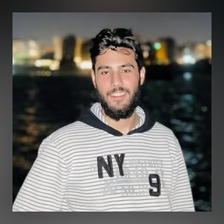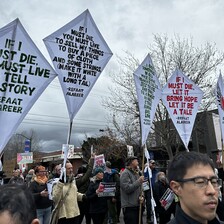The Electronic Intifada 15 December 2023

Refaat Alareer gave his students a sense of confidence.
I spent my first and second years in university without caring about studying. At the beginning of the third year, I promised myself that I would stop procrastinating.
But I needed something to motivate me. Something to keep me going.
“Wow, the metaphor you used is mindblowing.”
Those were the words that turned me into a different person.
They were the words of Dr. Refaat Alareer.
I was over the moon that Dr. Refaat told me he was impressed by something I had written.
I started to read more and focus on studying. I wrote many poems just to listen to Dr. Refaat’s comments.
During my first two years at university, I had not given any presentations. I was always shy.
I refused to publish anything on social media or to speak in front of people.
“Are there any other tasks I can do instead of publishing?” I asked Dr. Refaat. “I don’t feel comfortable with the idea and I am shy about doing so.”
He told me that there were no other tasks.
“You must tell people that you’re studying English literature.” Dr. Refaat said – in a gentle tone. “You must express and trust yourself, Khaled.”
Dr. Refaat’s words changed my personality.
Grabbing our attention
I had never been an early bird at university. I had never attended any lecture that was scheduled at 8 am.
But after attending one lecture by Dr. Refaat, I made sure to not miss any of his – even though the lecture was at 8 am. I even made sure to come to the lectures very early so that I could sit near the front and hear him clearly.
Later, he suggested that we should have channels on YouTube and post our presentations there. I was the first student to tell him that I had posted one of mine.
He was impressed and said, “You’re an excellent student.”
I was very happy hearing those words from him. I went to my friends, boasting about how Dr. Refaat praised me.
He was our friend, too. He taught us how to create memes and use them effectively in our studies.
If we lost attention in class, he would never get angry. He would instead grab our attention back by telling us a joke.
I remember when he teased me one day in the Shakespeare course. He was lecturing and saw me distracted and playing with my phone.
He said in a friendly way: “Notice Al-Qershali, for example, who does not pay attention in lectures and who copies from his friends in exams.”
My friends and I laughed, regaining our focus.
Dr. Refaat was more than a teacher of literature. He taught me that words can be used in many ways.
He has been my role model in defending the Palestinian cause since then.
I remember when I looked at his Facebook page and saw that he had done interviews with media outlets. I was impressed that Dr. Refaat was not only an educator but a fighter.
I wanted to be like him.
I wanted to be a writer, a poet, a journalist. And to defend my cause.
He was my inspiration.
He still is.
He taught my friends Mahmoud and Khaled creative writing at We Are Not Numbers.
I wanted him to teach how we could defend Palestine by writing stories. Just like he did.
Now that Israel has assassinated him, Dr. Refaat will obviously not be able to teach in person. But that won’t stop me from following the fine example that he set.
Dear Dr. Refaat, you are not dead.
You are still alive in the heart of every student you taught. I will never forget you or your influence on me.
I promise that I will continue learning, writing and defending Palestine until I see you again in heaven. Inshallah.
I’m sure that if you were alive, you would tell me, “Good job, Khaled. You must continue writing.”
Rest in power, dear Dr. Refaat.
Khaled Al-Qershali is a writer and translator.





